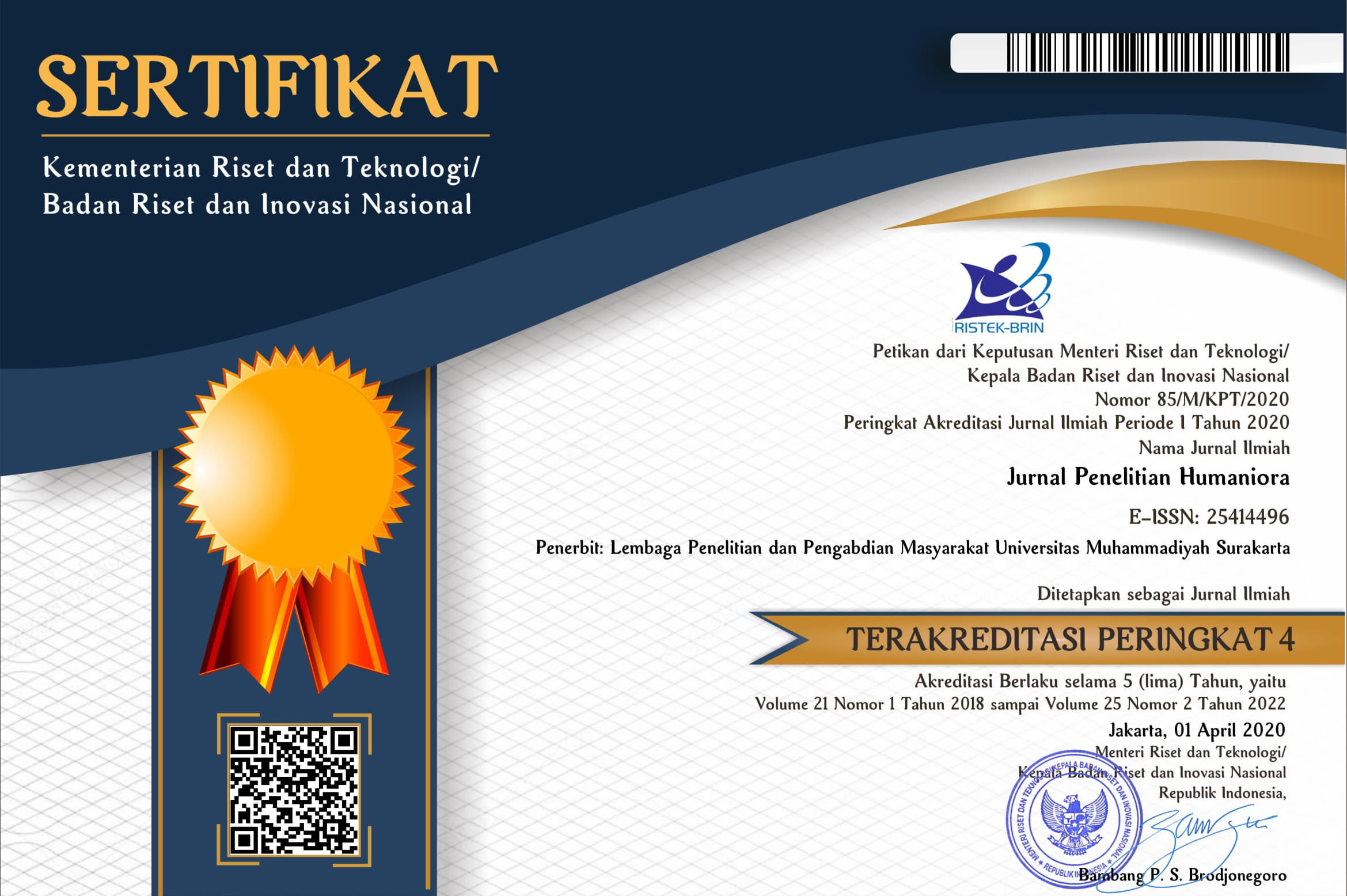PEMBELAJARAN PENJUMLAHAN BILANGAN PECAHAN DENGAN METODE CONTEXTUAL TEACHING AND LEARNING (CTL) DI SD MUHAMMADIYAH PROGRAM KHUSUS, KOTA BARAT, SURAKARTA
Yulia Maftuhah Hidayati(1*)(1) Universitas Muhammadiyah Surakarta
(*) Corresponding Author
Abstract
Keywords
Full Text:
PDFReferences
Andika. 2009.” Pembelajaran Kontekstual”. (www.teoripembelajaran.teknodik.net). Diakses 13
Mei 2009 jam 12.52.
Depdiknas. 2007. Naskah Akademik Pendidikan Keterampilan. Jakarta: Depdiknas. (www.puskur.net). Diakses 22 Mei 2009 jam 14.14.
Fitriyani, Wulan. 2010. “Upaya Meningkatkan Hasil Belajar Pecahan Siswa Kelas IV SD Sekaran Kota Semarang Melalui Pembelajaran Berbasis Masalah.” (http://digilib.unnes.ac.id). Diakses
Agustus 2010).
Gita, I Nyoman. 2007. “Implementasi Pendekatan Kontekstual untuk Meningkatkan Hasil Belajar Matematika Siswa di Sekolah Dasar”. Jurnal Penelitian dan Pengembangan Pendidikan. Vol.1, No.1. (http://freewebs.com). Diakses 9 Februari 2010 jam10.44.
Hadi, Syaiful. 2008. “Pembelajaran Konsep Pecahan dengan Menggunakan Media Komik dengan Strategi Bermain Peran pada Siswa SD Kelas IV Semen Gresik”. (http:// www.puslitjaknov.org). Diakses 9 Februari 2010 jam 10.29.
Hamalik, Oemar. 2003. Proses Belajar Mengajar. Jakarta: Bumi Aksara.
Haryani, Ning. 2006. “Manajemen Pembelajaran Aktif dalam Meningkatkan Mutu Pembelajaran di Sekolah Dasar”. Tesis. UMS: Tidak diterbitkan.
Moleong, Lexy J. 2007. Metodologi Penelitian Kualitatif. Bandung: PT. Remaja Rosdakarya.
Mulyasa. 2007. Kurikulum Tingkat Satuan Pendidikan. Bandung: PT. Remaja Rosdakarya.
Purwoto. 2003. Strategi Pembelajaran Mengajar. Surakarta: UNS Press.
Smith, Bettye P. 2006. “Contextual Teaching and Learning Practices in the Family and Consumer Sciences Curriculum”. Journal of Family and Consumer Sciences Education. Vol. 24, No. 1. (http://www.natefacs.org). Diakses 1 Juni 2009 jam 7.33.
Syah, Muhibbin. 2003. Psikologi Pendidikan dengan Pendekatan Baru. Bandung: PT. Remaja Rosdakarya.
Tim. 2005. Kamus Besar Bahasa Indonesia. Edisi Ketiga. Jakarta: Balai Pustaka
Tonkes, E. J., Loch, B. and Stace, A.W..2005. “An Innovative Learning Model for Computation in First”. Journal of Mathematical Education in Science & Technology. v36 n7 p751 759. (http://www.eric.ed.gov). Diakses 3 Mei 2009 jam 08. 30.
Article Metrics
Abstract view(s): 1279 time(s)PDF: 2432 time(s)
Refbacks
- There are currently no refbacks.











